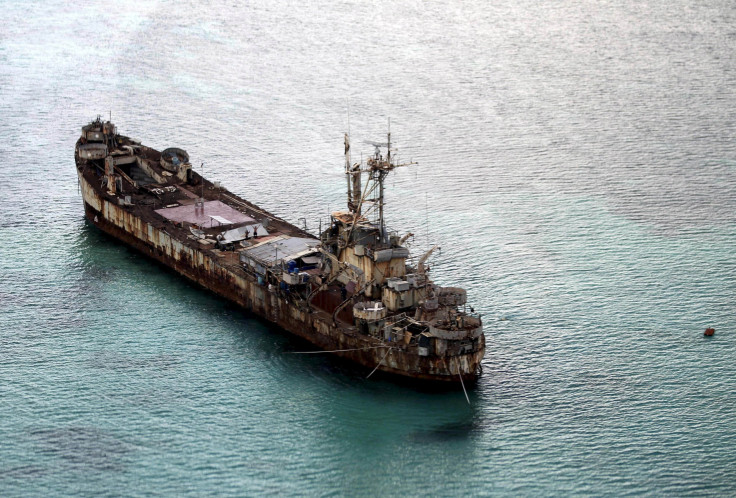Retired General Says China Could Reclaim Disputed South China Sea Reef From Philippines 'By Force'

SHANGHAI -- In a further sign of rising tension between Beijing and Manila over the South China Sea, China’s official Global Times newspaper has published an article by a retired senior military officer, calling for China to use force if the Philippines does not leave a disputed reef in the region.
Major General Luo Yuan, a leading hawk, said the Philippines had recently been “reinforcing” its presence on an old warship, which has been stranded on the disputed Ren’ai Reef since the 1990s. He said Chinese sovereignty over the disputed area was “beyond all doubt,” but Manila “stole the reef” -- known in English as Second Thomas Shoal, and in the Philippines as Ayungin Shoal -- by deliberately stranding the boat there.
Luo said if Manila, which he called a perpetual "troublemaker in the South China Sea,” was unable to remove the ship itself, it could pay China to repair and move it, adding that Beijing would treat the Philippines sailors on board “as refugees and give them humanitarian aid.” If, however, Manila declined these “generous offers,” Luo said, China “should drive away the ship and reclaim the reef by force,” and he said the methods China could use to do so were “beyond the Philippines’ imagination.”
The disputed reef has long been a source of tension between Manila and Beijing, and Luo, who is vice president of the China Strategy Culture Promotion Association, officially described as a non-governmental organization run by retired military officers, has previously spoken out on the issue. His views do not necessarily reflect those of China's top leadership. However, he is reported to be extremely well connected, and his latest comments come as China takes an increasingly assertive stance to what it says is its sovereignty over islands in the region -- including reclaiming an area of land large enough to build an airstrip on Fiery Cross Reef -- and may also reflect Beijing’s concern at recent developments in the Philippines.

Local reports say Manila has begun repairing the stranded vessel, the BRP Sierra Madre. Luo also criticized the Philippines’ plans to reopen the Subic Bay naval base, formerly used by the U.S. Military, to boost its defenses in the South China Sea. And a separate commentary in the Global Times further criticized the Philippines for welcoming the weekend’s overflight of disputed islands in the region by Admiral Scott Swift, Commander of the U.S. Pacific Fleet. Beijing has said Swift's action damaged mutual trust between China and the U.S., and the Global Times said Manila was deluding itself if it thought the U.S. action could change China's attitude on territorial issues.
The paper suggested the Philippines needed to be “cautious” in the area: it said China would not “start up conflicts with the Philippines… But if Manila oversteps the red line for any reason, Beijing will strike back regardless of Washington's attitude.”
The comments come as the Philippines is preparing to pass a new defense budget, featuring a 25 percent increase in spending, partly in response to disputes in the South China Sea, according to Agence France Presse. It quoted Philippine Budget Secretary Florencio Abad as saying the country needed to “protect what is clearly within our territorial jurisdiction" and be able to “effectively monitor the developments” in disputed zones.
The increased budget, of some $550 million, is dwarfed by China’s planned defense spending of $142.9 billion this year. However, the president of China’s National Institute for the South China Sea, Wu Shicun, suggested that countries like the Philippines were doing their best to draw the U.S. further into the dispute, in which Washington says it has no direct involvement.
Wu told the Global Times that, “Creating a hyped-up China threat to the South China Sea” would “help laws get passed in Japan and the Philippines to strengthen military cooperation with the US, which would help pave the way for the US to complete its containment strategy against China."
© Copyright IBTimes 2024. All rights reserved.





















